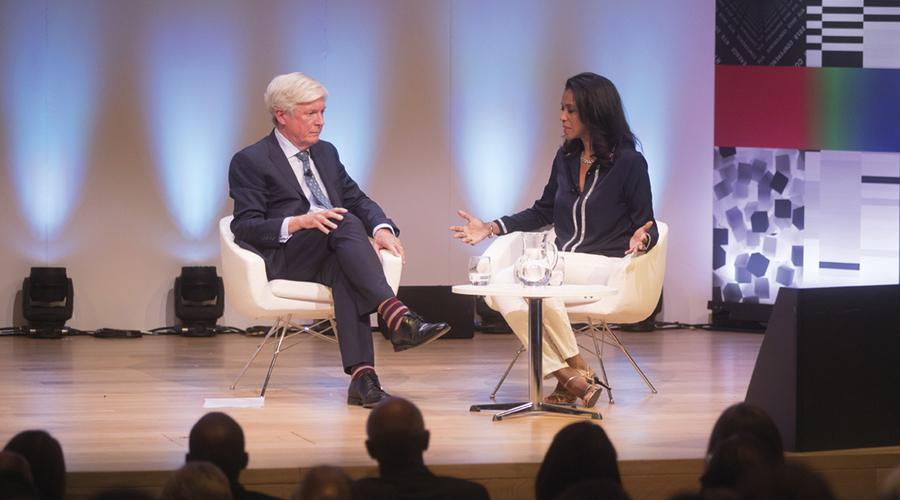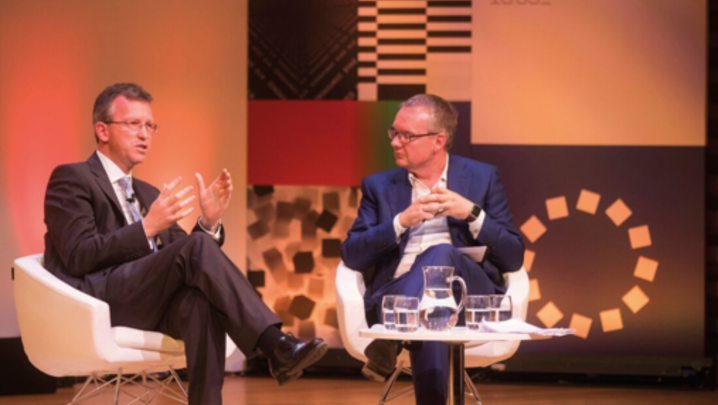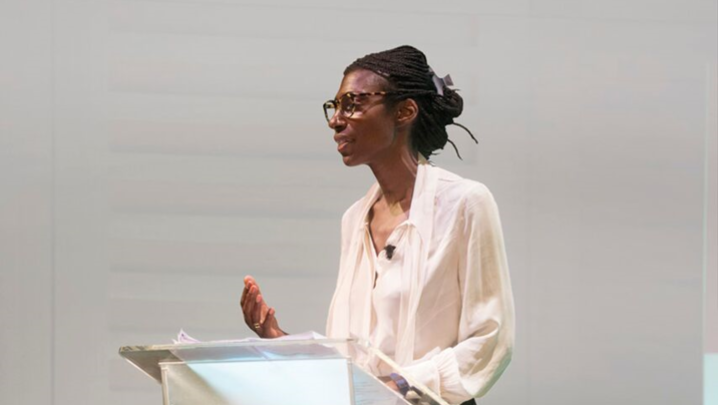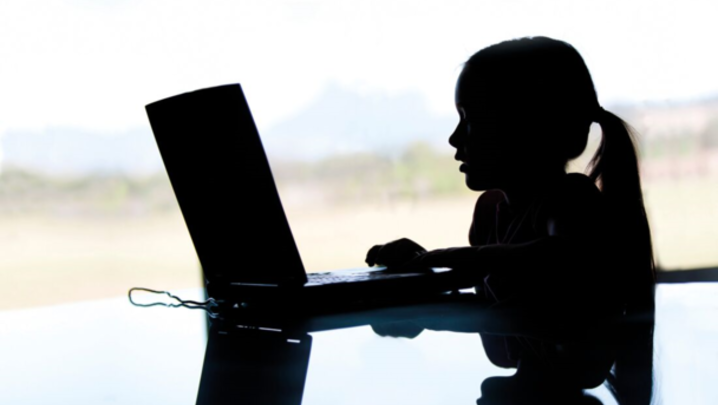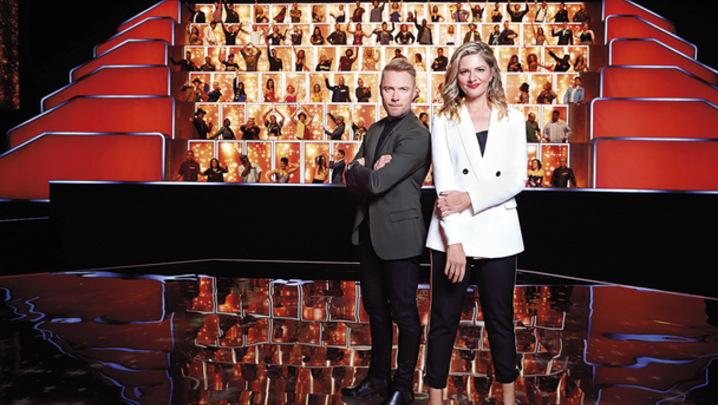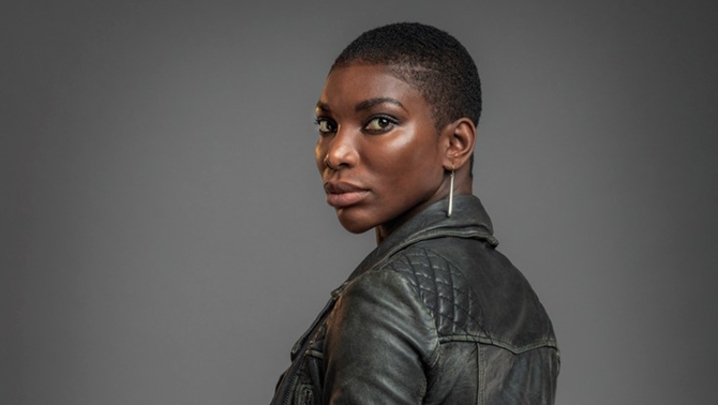Maggie Brown hears Director-General Tony Hall make an impassioned plea for more funding
Tony Hall’s keynote speech centred on the BBC’s need for more money. Only then would it thrive and retain its role at the heart of Britain’s democracy, in a world of technological change and intense competition from global media giants.
He insisted that “cracks are starting to show” in BBC services following a decade of austerity, licence-fee freezes and top slicing, which were threatening its ability to innovate and meet the digital challenge.
“While we believe the BBC’s public mission is as important as ever, we do not believe that what we currently do is sustainable with the resources we have,” he warned. “Doing nothing is a decision that may look fine tomorrow or the day after, but, in two years’ time, five years’ time, in 10 years’ time, it may look more like a grand national error.”
He complained about a lopsided regulatory playing field. “It cannot be right that the UK’s media industry is competing against global giants with one hand tied behind its back. Prominence, competition rules, advertising, taxation, content regulation, terms of trade, production quotas – one set of rules applies to UK companies, and barely any to the new giants.
“All this comes at a time when the BBC is also faced with taking on the full cost of free TV licences for those aged 75 and over. This has potential implications both for the BBC’s funding and for licence holders.
“The concession, as it is currently formulated, comes to an end in 2020. The BBC Board will have to consult on possible options and then decide. It could be the same, it could be different. There are a variety of options.”
For the BBC, this is the most serious legacy of the 2016 Charter and Agreement, overseen by former Chancellor George Osborne, claimed Hall. He raised the issue with the Digital, Culture, Media and Sports Committee in a session on 11 September.
In response to a question from his interviewer, BBC reporter Zeinab Badawi, Hall referred to the political pressures weighing on him and his predecessor, Mark Thompson: “We have never had the space to say, ‘What is the right level of funding for the BBC?’, and I think we now need to have that debate. The line has always been: ‘It’s too big, cut it.’”
The compensation paid to the BBC by government for the current 4.55 million free TV licences (introduced in 2000) is being phased out in three steps – falling from £655m in 2017-18 to £468m in 2018-19 and a final £247m payment in 2019-20. At that point, the value of the free licences could be £725m.
Hall juxtaposed the constraints on the BBC and the decline in public service TV spending with what he called “the big shift”, as global media giants have created new definitions of market scale. At the same time, younger people have drastically changed their viewing habits.

“Ten years ago, when the App Store first launched, not a single member of Facebook, Amazon, Apple, Netflix and Google (the Faangs), were among the top 30 most valuable companies in the world.
Fast-forward 10 years… all but one is now ranked in the top 10 most valuable companies. Audiences have changed. Bodyguard may have us all on the edge of our seats but, for young British audiences, Netflix is now roughly the same size as Channel 4 and close to the size of BBC Television and iPlayer together.”
He added: “Across the same 10 years that the internet giants took over the world, what the BBC could spend from the licence fee on its UK services has been cut by a fifth – £800m – in real terms. It is the consequence of a decade of top slicing and then freezing the licence fee for seven years – and then more top slicing.”
In addition to paying for the over-75s’ TV licences, the BBC has taken on responsibility for funding a variety of services: the World Service (£268m), S4C and BBC Monitoring, plus assisting broadband roll-out and local news.
“Here’s how much Netflix is spending a year on content: $8bn. Amazon is spending $5bn. And here’s how much Britain’s public service broadcasters are spending on new programmes: £2.5bn, all of us together.
While their spending is going up, ours is going down. In those 10 years, while the big shift was getting going… public service broadcasters reduced their annual spending by around £700m in real terms”.
“High-quality production costs money. A decade ago, premium high-quality drama might have cost £1m an hour in today’s money. Premium drama today routinely costs many times that figure. This has resulted in the BBC needing to spend significantly more just to stand still.”
Moreover, Hall pointed out that “Netflix and Amazon are not making up the difference” for UK production. Ofcom data suggests that less than 10% of their catalogues is made up of UK content, with spending on new UK programmes at around £150m a year.
“Co-production has helped… for a while, but those deals are becoming rarer. You can argue about the size of the future gap, but there is no doubt that there is a gap today in funding public service broadcasting, and there’s going to be one in the future.
“This isn’t just an issue for us economically and commercially, or as institutions. There is an impact on society. The content that we all produce is not just an ordinary consumer good. It helps shape our society. It brings people together.
“It helps us understand each other and creates an incredibly powerful shared narrative. And people feel that deeply. They want content that is relevant to their lives and they want to see people like themselves.”
Hall acknowledged the opportunity that the new environment of choice offered but observed that “reinventing our services will also cost more. We need to continue to invest in technology and product development.
“People now expect to be able to watch programmes when they want over a long period of time. To keep up with audience expectations, we’ll need to increase the availability of our content for much longer, from 30 days to months or possibly even years.”
But the reality was that “more cuts have been taking place over a far longer period than at any other in the BBC’s history”. He itemised the major cuts: a decade of saving 4.5% a year; reducing the “controllable costs” of running the BBC to 6%; decommissioning great programmes or having them move to other broadcasters (examples included losing Formula 1 and sharing the Six Nations tournament); and closing BBC Three as a broadcast channel.
All this had been done simply to meet savings targets, “while what the BBC can spend from the licence fee on its UK services has been cut by a fifth.
These pressures are really intense. We have been through a long period of holding back and cutting back. The BBC made its contribution as the nation sought to get back on track financially.
“But now, is the country going to seize the moment and adapt and invest in the face of what is going on – or are we just going to sit back and let it wash over us? We must remain true to our mission. We must have the funding that allows us to respond effectively. And we must be able to make innovative changes.”
He identified five key areas for action. “First, we will have to spend more on the highest-quality content. We cannot allow any further narrowing of the range of distinctive British content. Bodyguard, Three Girls, Mother’s Day, they tell stories that are important in connecting to our audiences.
“Second, we need to keep reinventing our services, reshaping BBC Online. It’s the only UK website in the top five and it’s the only one powered by its own content.
“That’s why we are focusing on building just eight world-class services (iPlayer, news, music and spoken word, weather, sport, children, BBC Bitesize and BBC Home). We are transforming iPlayer from a catch-up service to a destination, and a new audio service, BBC Sound, will replace iPlayer Radio.
“Third, we must invest more in children and young adults. We need to safeguard the future of public service broadcasting for coming generations.” The BBC is currently the largest provider of media for young adults, at eight hours a week, while the next nearest competitors, Spotify and YouTube, are at four hours each.
“This new competition has meant that the time young audiences spend with the BBC has fallen in recent years… but we all know that, with the right content and right services, we can introduce a new generation to the enduring values of what public service broadcasting can offer.” The corporation is investing an extra £34m in children’s content.
Fourth, “we must help counter threats to democracy globally. And these are real. The plague of disinformation and fake news needs to be challenged not just in the UK but around the world, too. We need a strong BBC to push against fake news and hold those who produce it – here and abroad – to account. BBC News is trusted across the globe. Sustaining and building on this has to be a priority for our country.
“Fifth, most significantly, the BBC will spend more outside London.” (See box below.)
Hall concluded on an upbeat note: “Britain’s media output is a source of soft power and global persuasion. We are going to need it more than ever at a moment when we are reshaping our relations with the world. It’s a beacon for liberty and democracy and truth that shines bright, and can – and must – shine as brightly in the future.
“I have huge confidence in our future. Yes, the big shift is happening but, with the right backing, we can win.”
What touched the delegates was the heartfelt nature of his plea for more resources. One delegate summed it up: “I saw an executive saying it has got to end. I don’t think the Director-General is bluffing.”
Why the BBC must have more of its staff outside London
‘Already, more than half of our teams and our spend on commissioning is outside of London,’ said Lord Hall. ‘But, to truly reflect the whole of the UK in our output, the BBC not only needs to invest more, it needs to do so outside of the M25.
‘That will mean more money spent around England and the nations. And more of our staff will be located outside London. The BBC’s move to Salford is a game changer, it is wonderful. Ten years on, MediaCityUK’s success is something that we need to build on.
‘This is what we can do for Britain. And it is what the public expects from us: distinctive programmes that reflect their experiences and outlook on life, available and relevant to everyone, of all ages and demographics.
‘We have a special duty to make programmes and services about British people and British culture. And we have a duty to do this for everyone, because, in a democracy, everyone should have the right to share in the best our culture has to offer: the front row, the best seat, the finest programmes and services, the most trusted news for everyone.
‘I will repeat those last words. For everyone. Because we’re funded by everyone, we feel a moral duty to serve everyone.’
Session Five, ‘Tomorrow’s BBC: Meeting the challenges of the future’, was produced by Sue Robertson and Martin Stott. BBC Director-General Tony Hall was interviewed by BBC World News reporter Zeinab Badawi.

